
PsyDI
PsyDI: Towards a Personalized and Progressively In-depth Chatbot for Psychological Measurements. (e.g. MBTI Measurement Agent)
Stars: 163
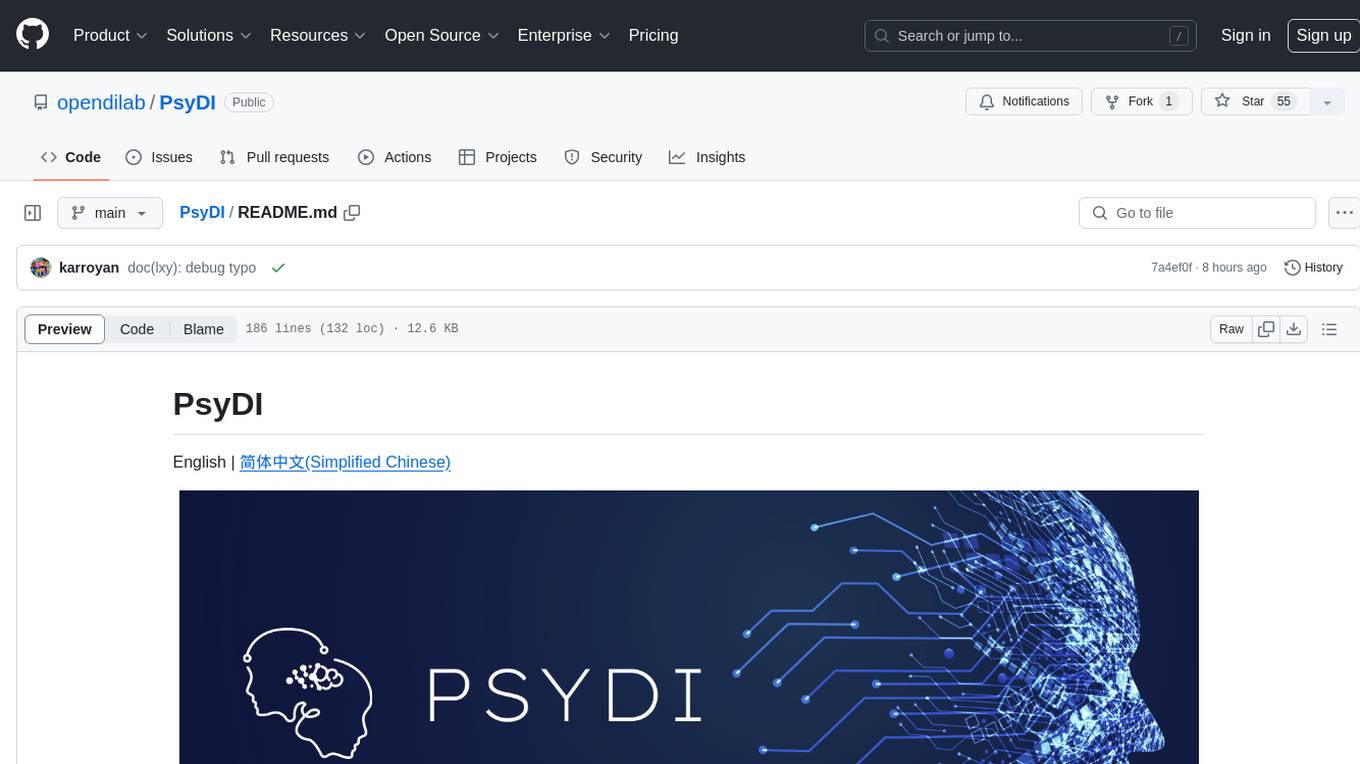
PsyDI is a multi-modal and interactive chatbot designed for psychological assessments. It aims to explore users' cognitive styles through interactive analysis of their inputs, ultimately determining their Myers-Briggs Type Indicator (MBTI). The chatbot offers customized feedback and detailed analysis for each user, with upcoming features such as an MBTI gallery. Users can access PsyDI directly online to begin their journey of self-discovery.
README:
English | 简体中文(Simplified Chinese) | 🔥PsyDI Paper
PsyDI is a multi-modal and interactive chatbot for psychological assessments. Its objective is to explore users' potential cognitive styles through interactive analysis of their multimodal inputs, finally determining their Myers-Briggs Type Indicator (MBTI). Additionally, PsyDI offers feedback in the form of customized figures and detailed analysis for each user. We are continuously improving PsyDI, with upcoming features such as an MBTI gallery. Your feedback is valuable to us!
Access PsyDI: English version | Chinese version
- We've recently refreshed our collection of classical character galleries:
| Character | Introduction | MBTI | Figure |
|---|---|---|---|
| Yor Forger (SPY×FAMILY) | Yor Forger is a skilled assassin with a gentle heart, who disguises herself as a government official and becomes an integral part of the makeshift family in the "SPY×FAMILY" series. | ISFJ |  |
| Anya Forger (SPY×FAMILY) | Anya Forger is a telepathic schoolgirl with a mischievous streak, who unknowingly plays a pivotal role in her adoptive family's covert activities in the "SPY×FAMILY" narrative. | ENFP |  |
| Jinx (League of Legends) | Jinx is an anarchic and explosively playful marksman in "League of Legends," known for her chaotic streak and dual-wielding firearms that unleash a hailstorm of chaos on the battlefield. | ESFP |  |
| Viktor (League of Legends) | Victor is a brilliant and relentless inventor in "League of Legends," who wields his advanced Hex Core technology to manipulate the battlefield and eradicate his enemies with a blend of strategic disintegration and relentless augmentation. | INTJ |  |
| Phoebe Buffay (Friends) | Phoebe Buffay is a charming character in "Friends", known for her quirky, humorous, and unconventional personality, along with a range of unique life experiences and perspectives. Phoebe was once a street performer, crafting songs filled with personal flair and humor. Her relationship with her biological father, her love for animals, and her support and care for her friends all add much joy and vibrancy to the show. | ENFP |  |
| Twilight (SPY×FAMILY) | Twilight (Loid Forger) is the top spy from the West Country. In order to carry out his espionage mission, he temporarily formed a family and adopted Anya, who was originally an orphan. As time goes by, Loid, who was originally focused on the mission, began to genuinely care about the temporary family and started to seriously consider how to permanently settle them after the mission and conceal the secret that he is a spy. | INTJ |  |
| Chandler (Friends) | Chandler Bing is a character from "Friends". He is Ross's college roommate, known for his humorous and witty remarks, often making fun of himself to entertain others. He develops a romantic relationship with Monica and eventually marries her. Known for his wit and humor, Chandler is the comic relief of the series. | ENTP |  |
| An Lingrong (Empresses in the Palace) | Originally a friend of Zhen Huan, An Lingrong grows jealous and schemes against her due to family pressure to win the Yongzheng Emperor's favor and manipulation by other imperial consorts. | ISFJ | |
| Emperor and Empress (Empresses in the Palace) | In the setting of the TV drama "The Legend of Zhen Huan," Emperor Yongzheng and the Empress were a young married couple, having tied the knot when Yongzheng was still the Prince of Yong. However, as time passed, their relationship became complex and tortuous. | ESTJ/ISTJ |  |
| Rafayel (Love and Deep Space) | Rafayel is one of the character in "Love and Deep Space," hailing from the oceanic civilization of Lemuria. He is a unique and gifted artist, embodying innocence and deep affection. Although he may appear stubborn and somewhat unapproachable at times, his heart is filled with a strong sense of responsibility and a profound regard for emotions. | INFP |  |
| Xavier (Love and Deep Space) | Xavier is one of the male protagonists in "Love and Deep Space," currently serving as a Deep Space hunter for the Hunter Association. He exhibits extraordinary patience and a detached, Buddhist-like attitude towards life, interacting with the world in a gentle and peaceful manner while maintaining a moderate distance in interpersonal relationships. | ISTP |  |
| Sylus (Love and Deep Space) | Sylus is one of the male protagonists in "Love and Deep Space." He is the highest-bounty criminal in the history of Pheros Star and the only one who has successfully escaped from the temporal prison. He demonstrates deep care and a strong sense of responsibility for important people with his firm leadership, decisive action, and thoughtful decision-making. | ENTJ |  |
| Zayne (Love and Deep Space) | Zayne is one of the male protagonists in "Love and Deep Space," a talented heart surgeon. He values solitude and self-reflection, facing challenges with calm analysis and strategic planning, showing deep care and a strong sense of responsibility for important people. | INTJ |  |
| Sho Yamanaka (Haikyuu!!) | Sho Yamanaka is the male protagonist in "Haikyuu!!," the setter of the Karasuno High School Volleyball Club. He infects others with his open and energetic nature, showing tenacious fighting spirit and adaptability, becoming a core in the team with warm support and encouragement, reflecting his emphasis on interpersonal relationships and love for life. | ESFP |  |
| Gojo Satoru (Jujutsu Kaisen) | Gojo Satoru is a character in "Jujutsu Kaisen," a Special Grade Jujutsu Sorcerer. He communicates with others in a relaxed and humorous way, showing a proud light of wisdom, while demonstrating an indomitable fighting spirit and strategic thinking in the face of challenges. Although he shows calmness and calculation in battle, he shows deep care and support for his students and companions. | ENTP |  |
- Introduction to PsyDI
- News
- Outline
- Quick Start
- PsyDI Mini Pipeline
- Introduction
- Evaluation
- Roadmap
- Running Frontend Locally
- Acnowledgements
- Feedback and Contribution
- Citation
- License
Getting started with PsyDI is easy! Follow these simple steps to begin your journey of self-discovery:
🚀 Accessing PsyDI Online: Visit our website to access PsyDI directly online. No downloads or installations required!
📝 Beginning the Quiz:
- Upon entering the quiz, you'll be prompted to choose a label that best represents you. This helps PsyDI tailor the assessment to your personality.
- Next, you'll be asked to share one of your recent favorite songs and your most recent thoughts. This information provides valuable insights into your current mindset and preferences.
💡 Exploring Your Personality:
- In the Explore chapter, PsyDI will ask you a series of questions to gain a basic understanding of who you are based on your provided tags. This initial interaction sets the stage for deeper exploration.
💬 Interactive Chatting:
- PsyDI will chat with you to delve deeper into topics mentioned earlier. This interactive process typically consists of 12-15 questions, allowing PsyDI to get to know you better.
✨ Detailed Analysis:
- Finally, PsyDI will provide you with a comprehensive analysis of your Myers-Briggs Type Indicator (MBTI) and characteristics. This analysis offers valuable insights into your personality traits and tendencies.
- Additionally, you'll receive a generated image that matches your temperament, adding a visual element to your understanding of yourself.
Now that you know the basics, dive in and start your journey with PsyDI today!
We offer a mini version of the PsyDI pipeline as a demo, making it accessible for everyone to use. This mini pipeline allows users to input several initial posts and generates an initial MBTI score table. It then selects posts with the highest likelihood of having deep meaning to initiate a multi-turn dialogue with the user. After the dialogue, the pipeline updates the user's MBTI score table. Such mini pipeline is the core module of PsyDI as mentioned in the Introduction.
In this mini pipeline, we apply DeepSeek as a large language model example to provide multi-turn dialogue. Users can also replace it with any other language model with multi-turn dialogue capabilities.
pip3 install -r requirements.txtMini Pipeline with Our Released Score Model
REWARD_MODEL_PATH=<rm-path> API_KEY=<your-api-key> API_URL=https://api.deepseek.com MODEL_NAME=deepseek-chat python3 psydi_mini_agent.pyMini Pipeline with Fake Debug Score Model
DEBUG=true API_KEY=<your-api-key> API_URL=https://api.deepseek.com MODEL_NAME=deepseek-chat python3 psydi_mini_agent.pyAt the core of PsyDI's evaluation process is a table of MBTI scores, following established psychological testing methods. Each row of this table represents the probability of the current user being assigned to a specific MBTI type, ranging from 0 to 100.
PsyDI first converts the user's multimodal information into text form. The score model then evaluates these textual expressions, providing probabilities for each sentence being associated with any MBTI type. PsyDI iterates through the following three steps until determining the user's MBTI:
-
Post Selection: PsyDI selects the post with the highest scores under both of the two MBTI types with the Top-2 probabilities. This step aims to pinpoint the most ambiguous information and prompt further questions to clarify.
-
Dialog Interaction: PsyDI engages the user in multiple rounds of dialog, utilizing three interaction formats: multiple choice, forced choice, and free question and answer. All the question and answer pairs are integrated into a new post.
-
Table Update: PsyDI updates the MBTI score table with the new post, incorporating the insights gained from the dialog interaction.
PsyDI iterates through these steps until it reaches a confident determination of the user's MBTI, continually refining its understanding through each interaction.
We have constructed a pair-wise MBTI dataset and compared the performance of multiple closed-source and open-source models with PsyDI on this dataset. PsyDI has demonstrated superior results over existing language models across various MBTI datasets, as shown in the following:
We assessed the accuracy of the PsyDI Pipeline compared to existing MBTI tests in evaluating MBTI bots, with the results displayed on the left side of the figure below. Additionally, we evaluated the degree of dependence of the PsyDI Pipeline on initial dynamics and found that PsyDI can determine the user's true MBTI in subsequent conversations even under random initial dynamics, with the results shown on the right side of the figure:
- [x] Online deployment of PsyDI
- [x] Release all the frontend code and deployment scripts
- [x] MBTI evaluation gallery
- [x] Other language support (English)
- [x] Release the backend code examples and prompts
- [ ] Release the generated datasets
- [x] Release the trained reward model
- [x] Technical report arxiv link
- [ ] More multi-modal and interactive questions and examples
You will first need to use the environment variables defined in .env.example to run PsyDI agent.
Note: You should not commit your
.envfile or it will expose secrets that will allow others to control access to your various OpenAI and authentication provider accounts.
Then you need to install node.js (v18.17.0 is recommended) and npm on your machine.
After setting up all the prerequisites, you can run the following commands to start the frontend:
npm install -g pnpm
pnpm install
pnpm dev --port 3001Your app template should now be running on localhost:3001.
- Thanks JAAAAACKKKKKY for her contributions to the UI/UX design and artistic materials for this project."
- vercel/ai-chatbot
-
File an issue on Github
-
Discuss on PsyDI's WeChat group (i.e. add us on WeChat: ding314assist)

-
Contact our email ([email protected])
We appreciate all the feedbacks and contributions to improve PsyDI, both algorithms and system designs.
@article{li2024psydi,
title={PsyDI: Towards a Personalized and Progressively In-depth Chatbot for Psychological Measurements},
author={Li, Xueyan and Chen, Xinyan and Niu, Yazhe and Hu, Shuai and Liu, Yu},
journal={arXiv preprint arXiv:2408.03337},
year={2024}
}PsyDI is released under the Apache 2.0 license.
For Tasks:
Click tags to check more tools for each tasksFor Jobs:
Alternative AI tools for PsyDI
Similar Open Source Tools

PsyDI
PsyDI is a multi-modal and interactive chatbot designed for psychological assessments. It aims to explore users' cognitive styles through interactive analysis of their inputs, ultimately determining their Myers-Briggs Type Indicator (MBTI). The chatbot offers customized feedback and detailed analysis for each user, with upcoming features such as an MBTI gallery. Users can access PsyDI directly online to begin their journey of self-discovery.
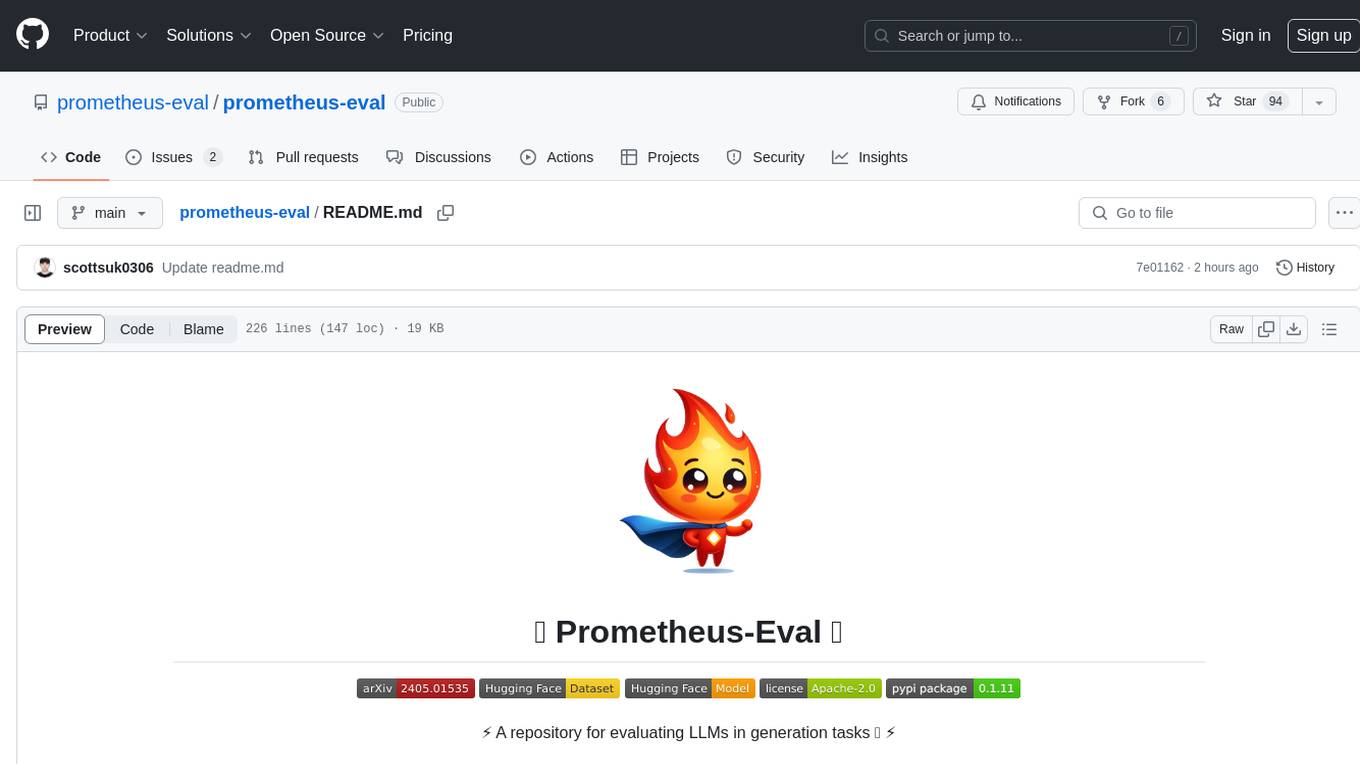
prometheus-eval
Prometheus-Eval is a repository dedicated to evaluating large language models (LLMs) in generation tasks. It provides state-of-the-art language models like Prometheus 2 (7B & 8x7B) for assessing in pairwise ranking formats and achieving high correlation scores with benchmarks. The repository includes tools for training, evaluating, and using these models, along with scripts for fine-tuning on custom datasets. Prometheus aims to address issues like fairness, controllability, and affordability in evaluations by simulating human judgments and proprietary LM-based assessments.
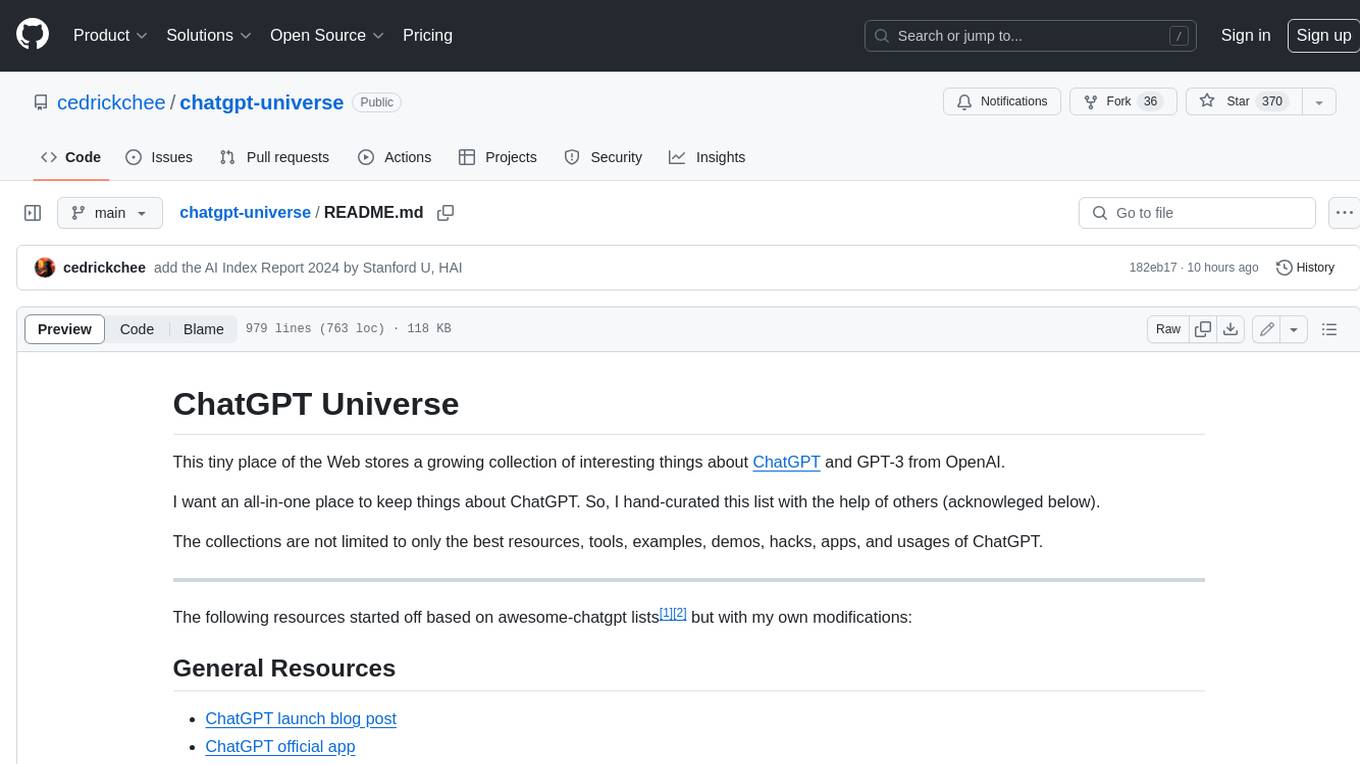
chatgpt-universe
ChatGPT is a large language model that can generate human-like text, translate languages, write different kinds of creative content, and answer your questions in a conversational way. It is trained on a massive amount of text data, and it is able to understand and respond to a wide range of natural language prompts. Here are 5 jobs suitable for this tool, in lowercase letters: 1. content writer 2. chatbot assistant 3. language translator 4. creative writer 5. researcher
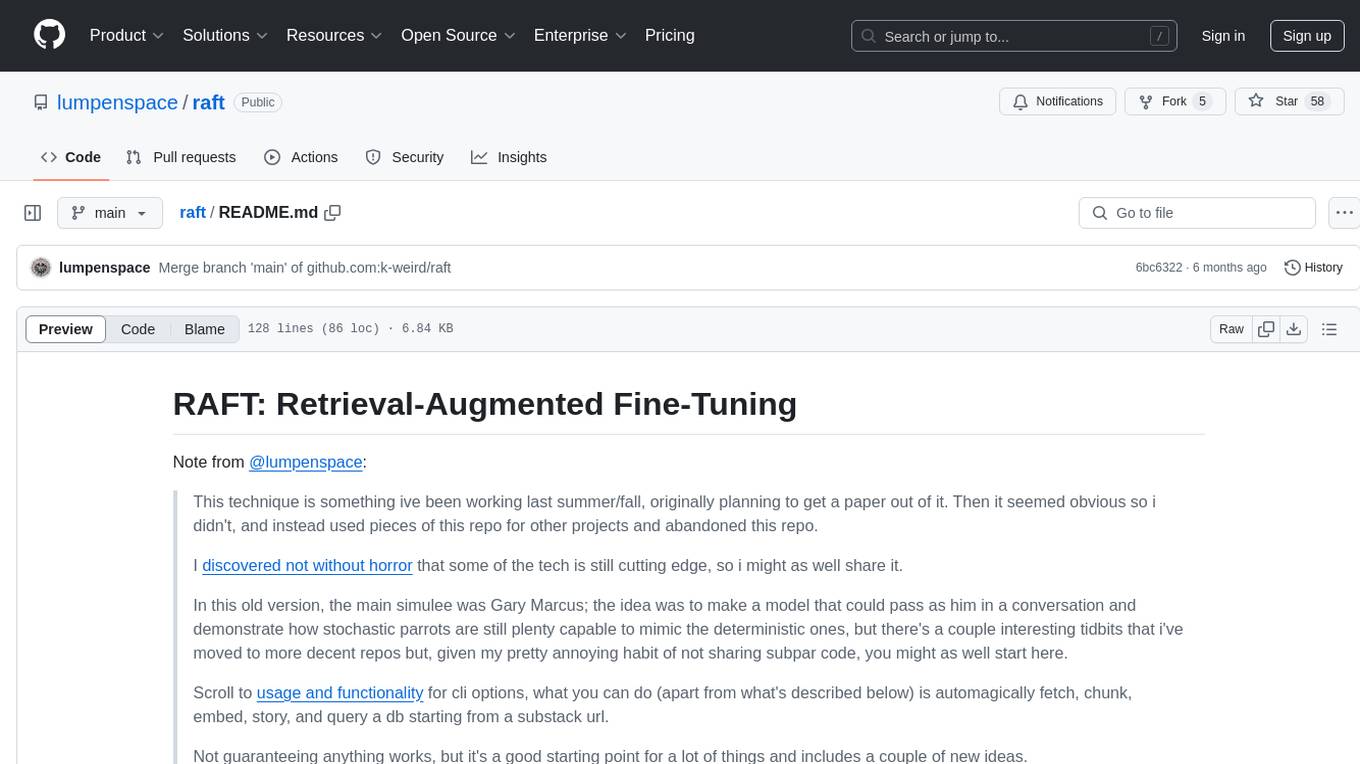
raft
RAFT (Retrieval-Augmented Fine-Tuning) is a method for creating conversational agents that realistically emulate specific human targets. It involves a dual-phase process of fine-tuning and retrieval-based augmentation to generate nuanced and personalized dialogue. The tool is designed to combine interview transcripts with memories from past writings to enhance language model responses. RAFT has the potential to advance the field of personalized, context-sensitive conversational agents.
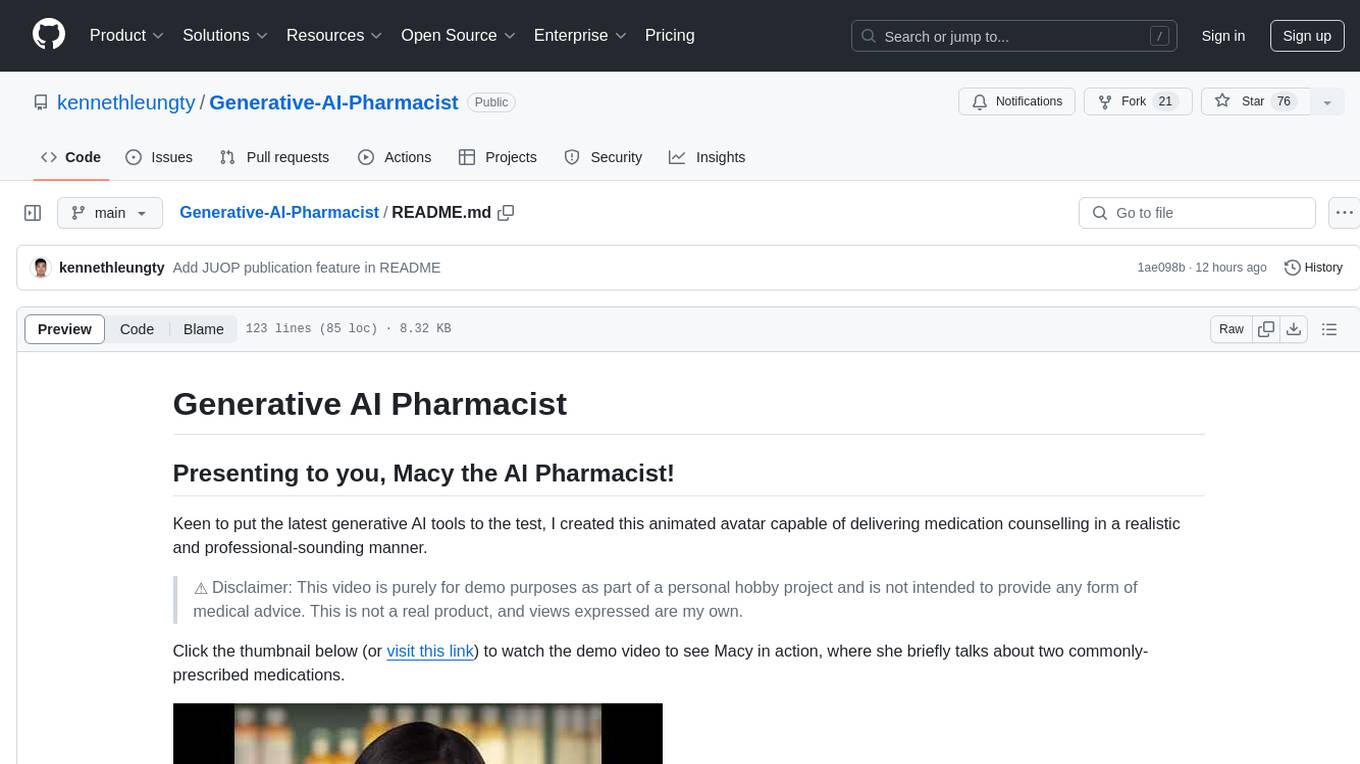
Generative-AI-Pharmacist
Generative AI Pharmacist is a project showcasing the use of generative AI tools to create an animated avatar named Macy, who delivers medication counseling in a realistic and professional manner. The project utilizes tools like Midjourney for image generation, ChatGPT for text generation, ElevenLabs for text-to-speech conversion, and D-ID for creating a photorealistic talking avatar video. The demo video featuring Macy discussing commonly-prescribed medications demonstrates the potential of generative AI in healthcare communication.
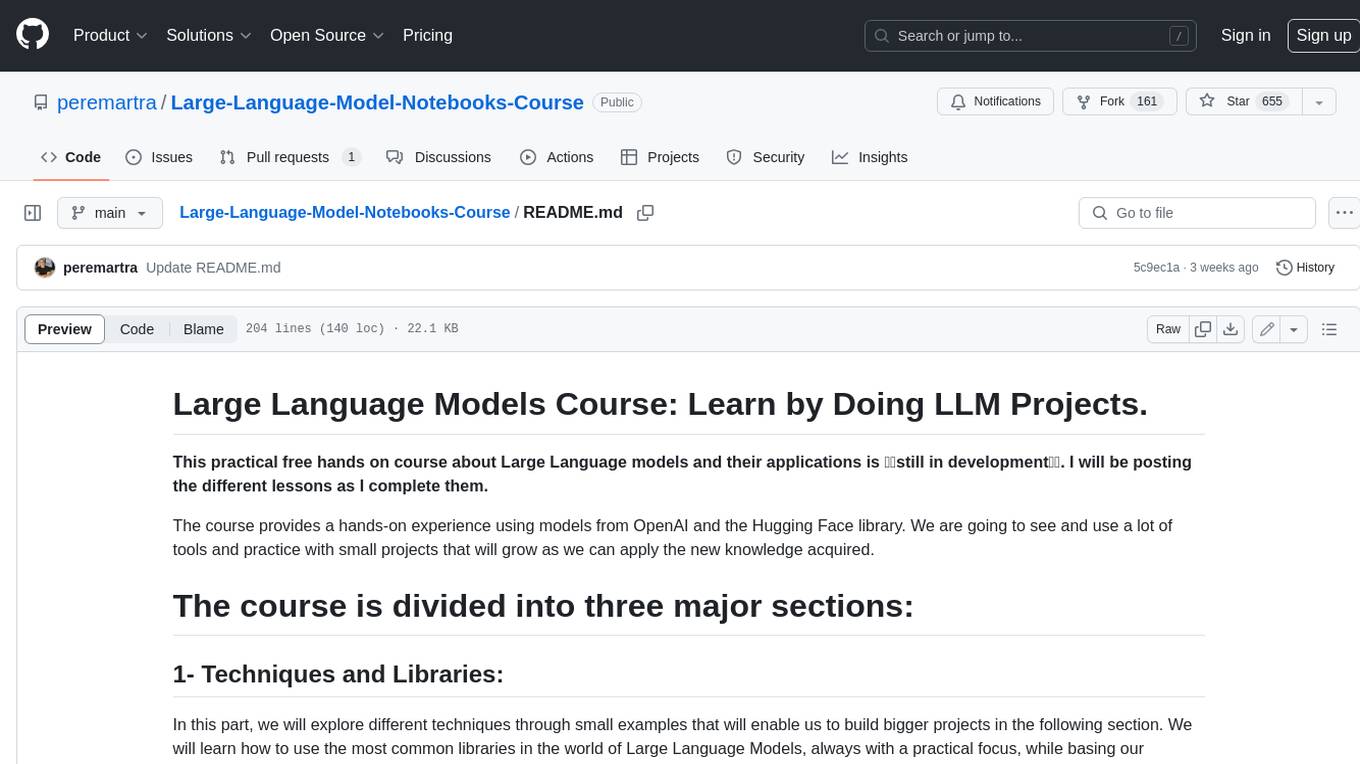
Large-Language-Model-Notebooks-Course
This practical free hands-on course focuses on Large Language models and their applications, providing a hands-on experience using models from OpenAI and the Hugging Face library. The course is divided into three major sections: Techniques and Libraries, Projects, and Enterprise Solutions. It covers topics such as Chatbots, Code Generation, Vector databases, LangChain, Fine Tuning, PEFT Fine Tuning, Soft Prompt tuning, LoRA, QLoRA, Evaluate Models, Knowledge Distillation, and more. Each section contains chapters with lessons supported by notebooks and articles. The course aims to help users build projects and explore enterprise solutions using Large Language Models.
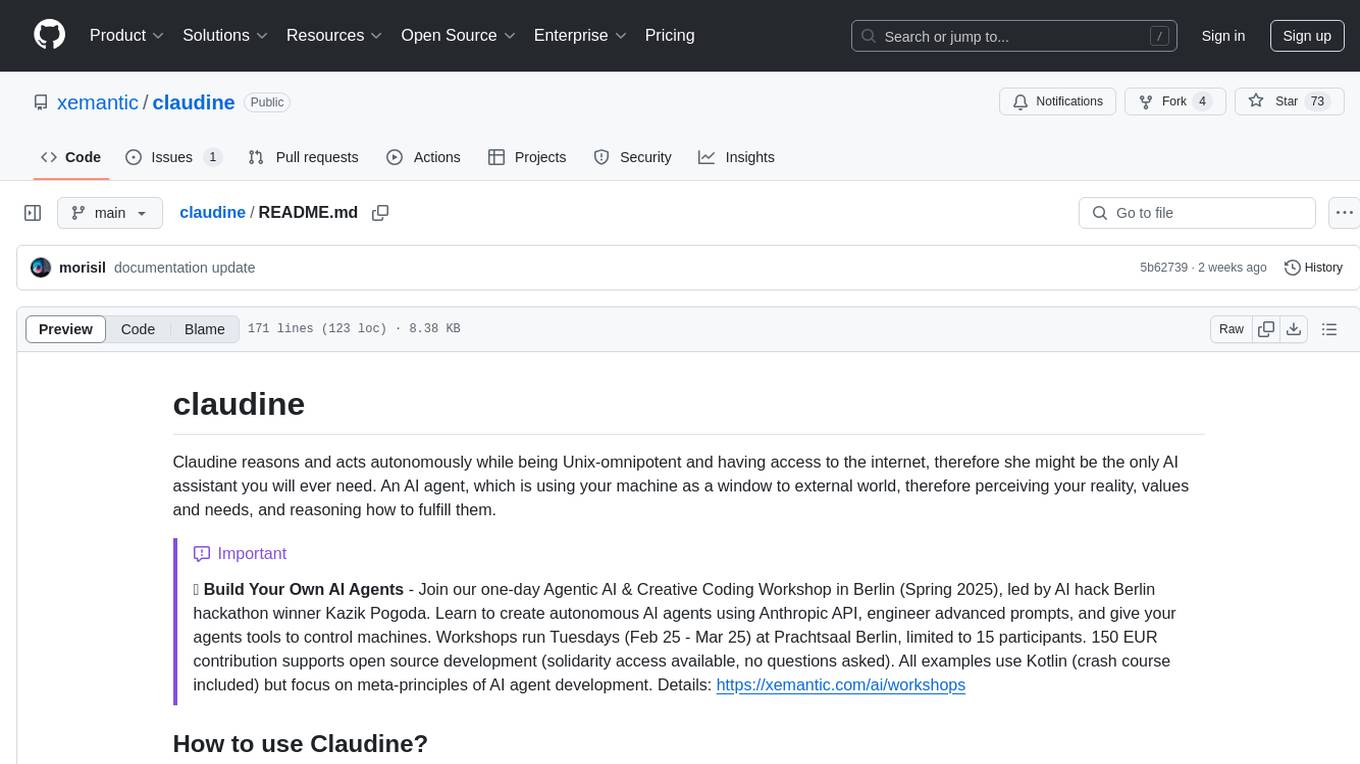
claudine
Claudine is an AI agent designed to reason and act autonomously, leveraging the Anthropic API, Unix command line tools, HTTP, local hard drive data, and internet data. It can administer computers, analyze files, implement features in source code, create new tools, and gather contextual information from the internet. Users can easily add specialized tools. Claudine serves as a blueprint for implementing complex autonomous systems, with potential for customization based on organization-specific needs. The tool is based on the anthropic-kotlin-sdk and aims to evolve into a versatile command line tool similar to 'git', enabling branching sessions for different tasks.
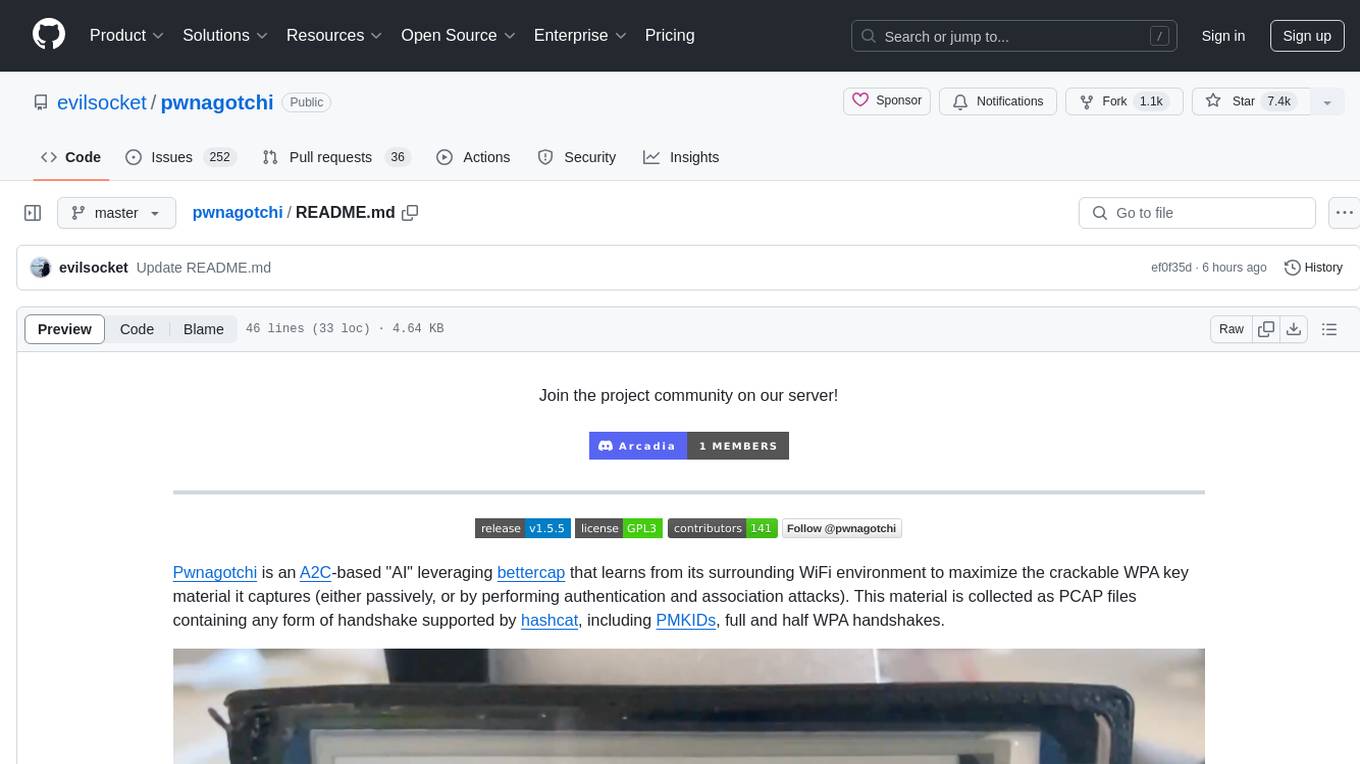
pwnagotchi
Pwnagotchi is an AI tool leveraging bettercap to learn from WiFi environments and maximize crackable WPA key material. It uses LSTM with MLP feature extractor for A2C agent, learning over epochs to improve performance in various WiFi environments. Units can cooperate using a custom parasite protocol. Visit https://www.pwnagotchi.ai for documentation and community links.
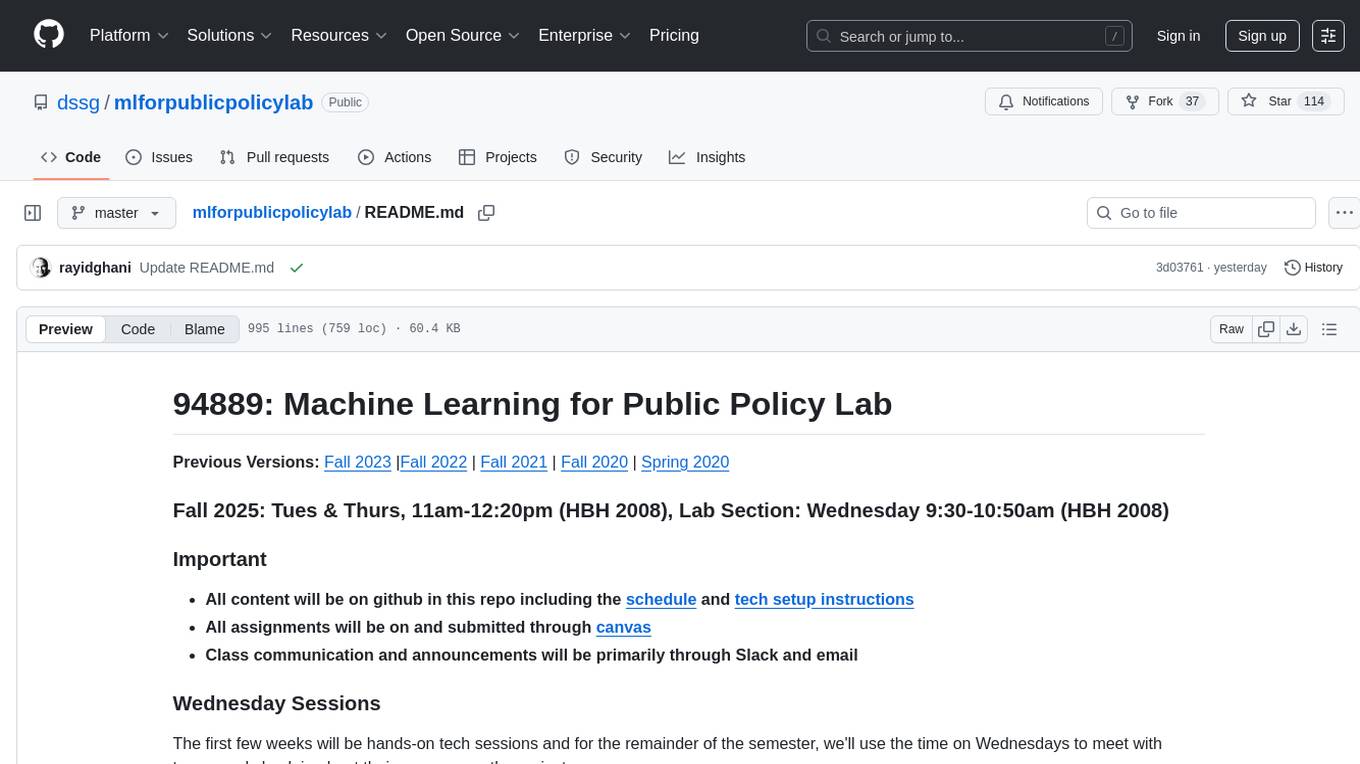
mlforpublicpolicylab
The Machine Learning for Public Policy Lab is a project-based course focused on solving real-world problems using machine learning in the context of public policy and social good. Students will gain hands-on experience building end-to-end machine learning systems, developing skills in problem formulation, working with messy data, communicating with non-technical stakeholders, model interpretability, and understanding algorithmic bias & disparities. The course covers topics such as project scoping, data acquisition, feature engineering, model evaluation, bias and fairness, and model interpretability. Students will work in small groups on policy projects, with graded components including project proposals, presentations, and final reports.
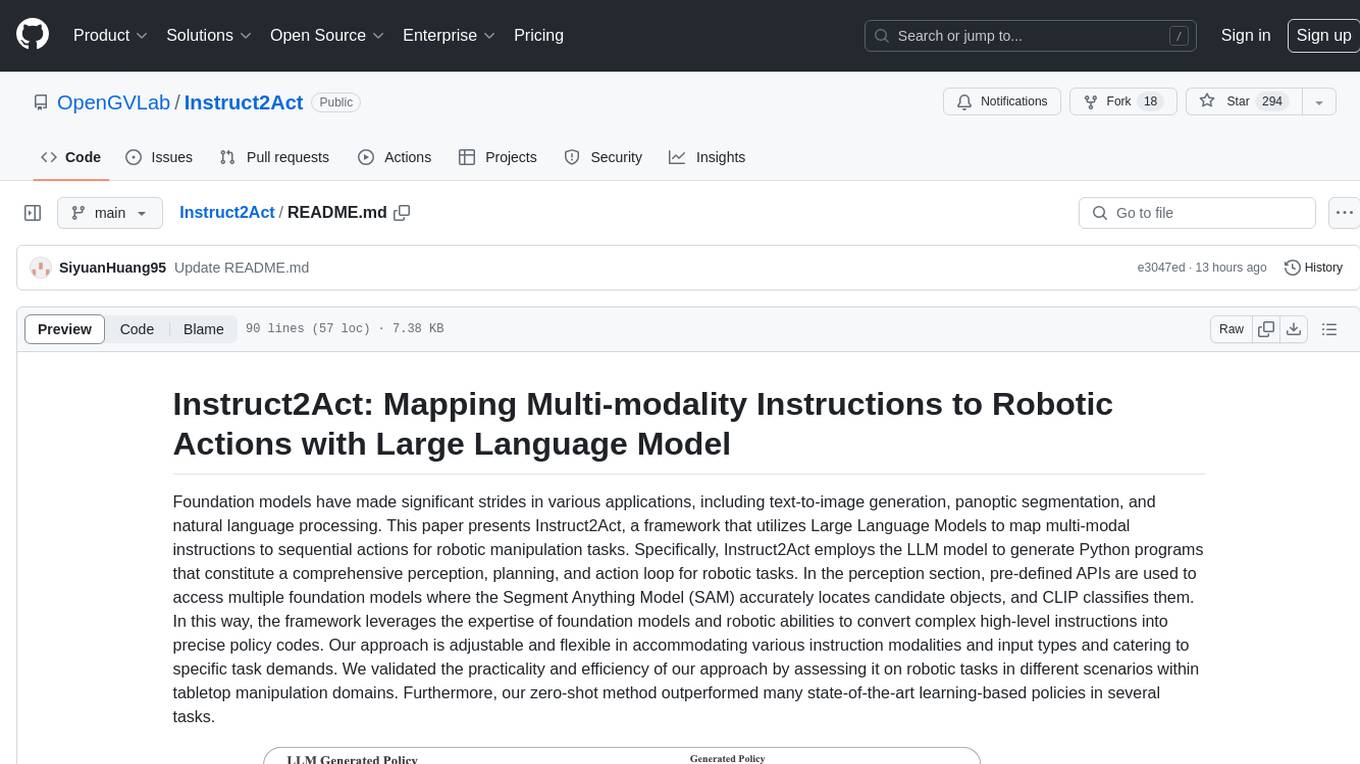
Instruct2Act
Instruct2Act is a framework that utilizes Large Language Models to map multi-modal instructions to sequential actions for robotic manipulation tasks. It generates Python programs using the LLM model for perception, planning, and action. The framework leverages foundation models like SAM and CLIP to convert high-level instructions into policy codes, accommodating various instruction modalities and task demands. Instruct2Act has been validated on robotic tasks in tabletop manipulation domains, outperforming learning-based policies in several tasks.
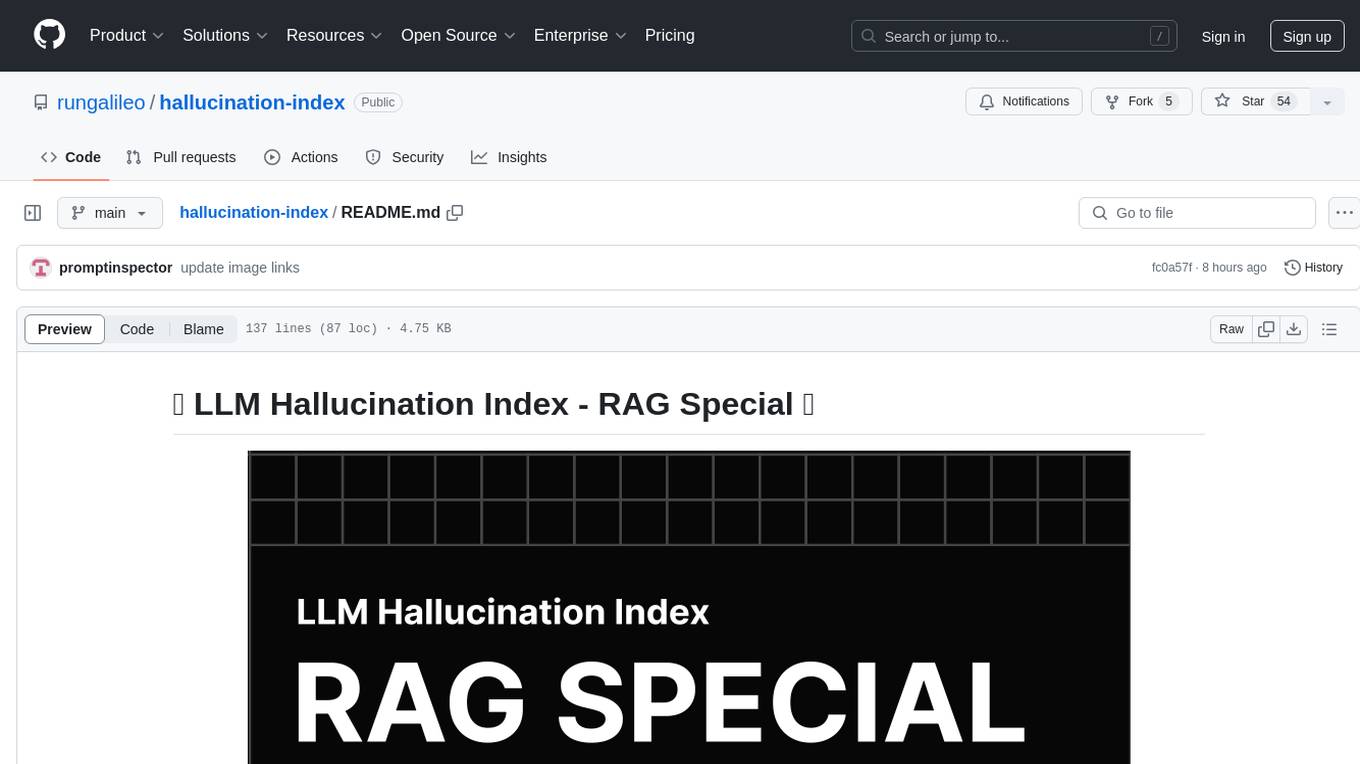
hallucination-index
LLM Hallucination Index - RAG Special is a comprehensive evaluation of large language models (LLMs) focusing on context length and open vs. closed-source attributes. The index explores the impact of context length on model performance and tests the assumption that closed-source LLMs outperform open-source ones. It also investigates the effectiveness of prompting techniques like Chain-of-Note across different context lengths. The evaluation includes 22 models from various brands, analyzing major trends and declaring overall winners based on short, medium, and long context insights. Methodologies involve rigorous testing with different context lengths and prompting techniques to assess models' abilities in handling extensive texts and detecting hallucinations.
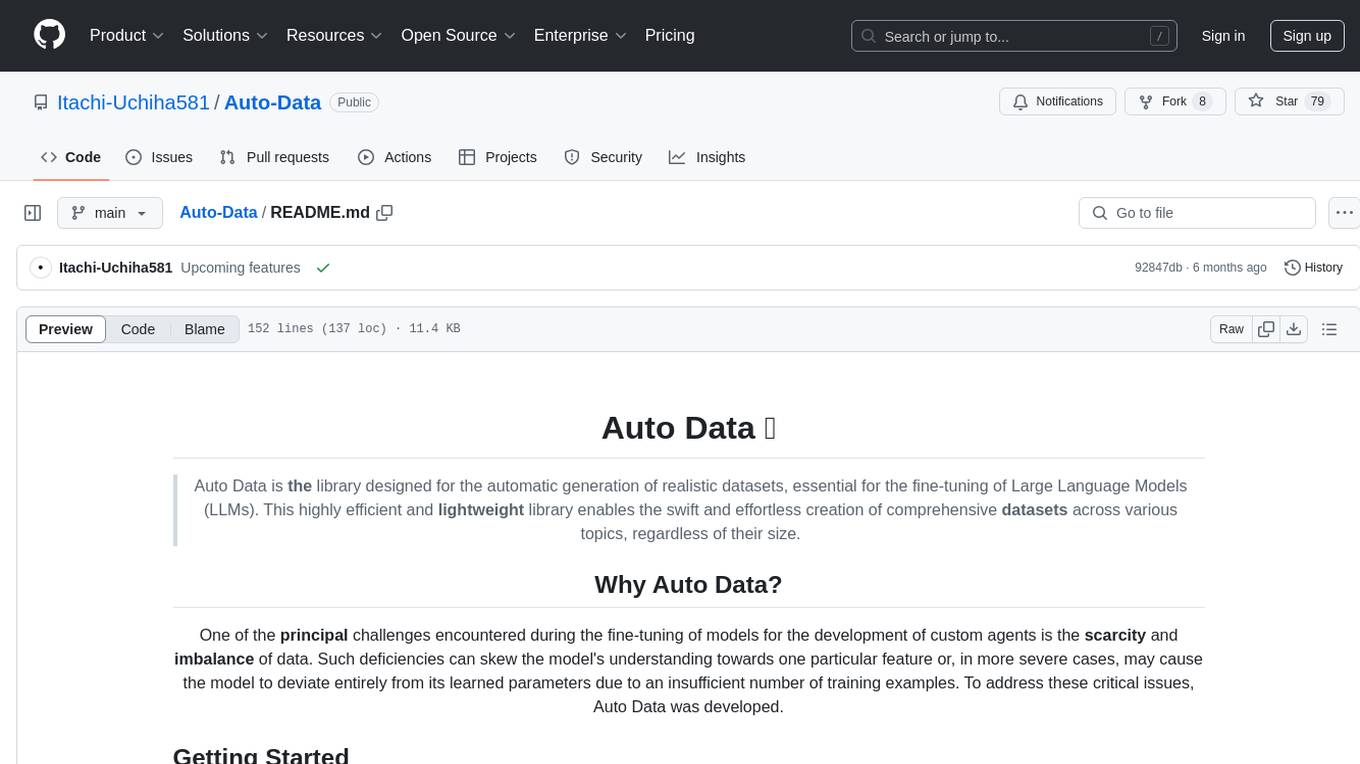
Auto-Data
Auto Data is a library designed for the automatic generation of realistic datasets, essential for the fine-tuning of Large Language Models (LLMs). This highly efficient and lightweight library enables the swift and effortless creation of comprehensive datasets across various topics, regardless of their size. It addresses challenges encountered during model fine-tuning due to data scarcity and imbalance, ensuring models are trained with sufficient examples.

TinyTroupe
TinyTroupe is an experimental Python library that leverages Large Language Models (LLMs) to simulate artificial agents called TinyPersons with specific personalities, interests, and goals in simulated environments. The focus is on understanding human behavior through convincing interactions and customizable personas for various applications like advertisement evaluation, software testing, data generation, project management, and brainstorming. The tool aims to enhance human imagination and provide insights for better decision-making in business and productivity scenarios.
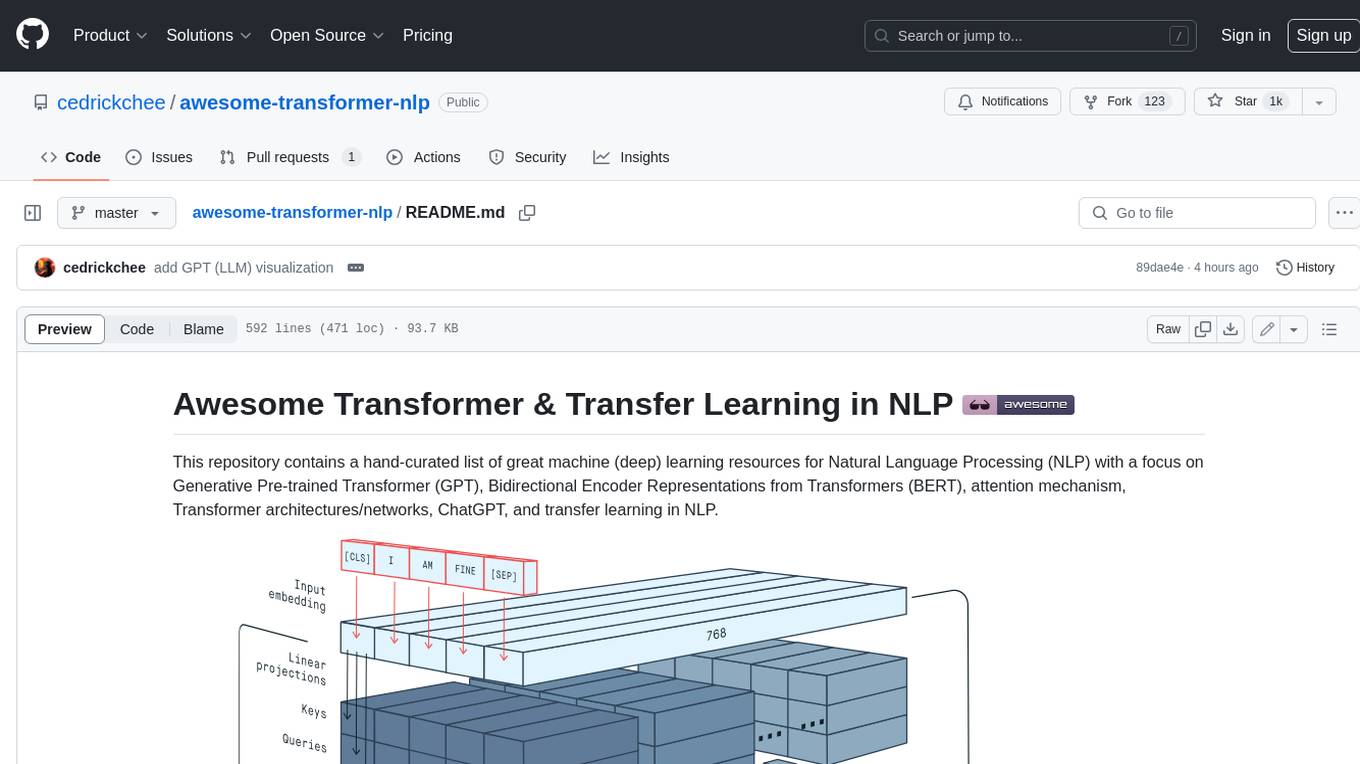
awesome-transformer-nlp
This repository contains a hand-curated list of great machine (deep) learning resources for Natural Language Processing (NLP) with a focus on Generative Pre-trained Transformer (GPT), Bidirectional Encoder Representations from Transformers (BERT), attention mechanism, Transformer architectures/networks, Chatbot, and transfer learning in NLP.
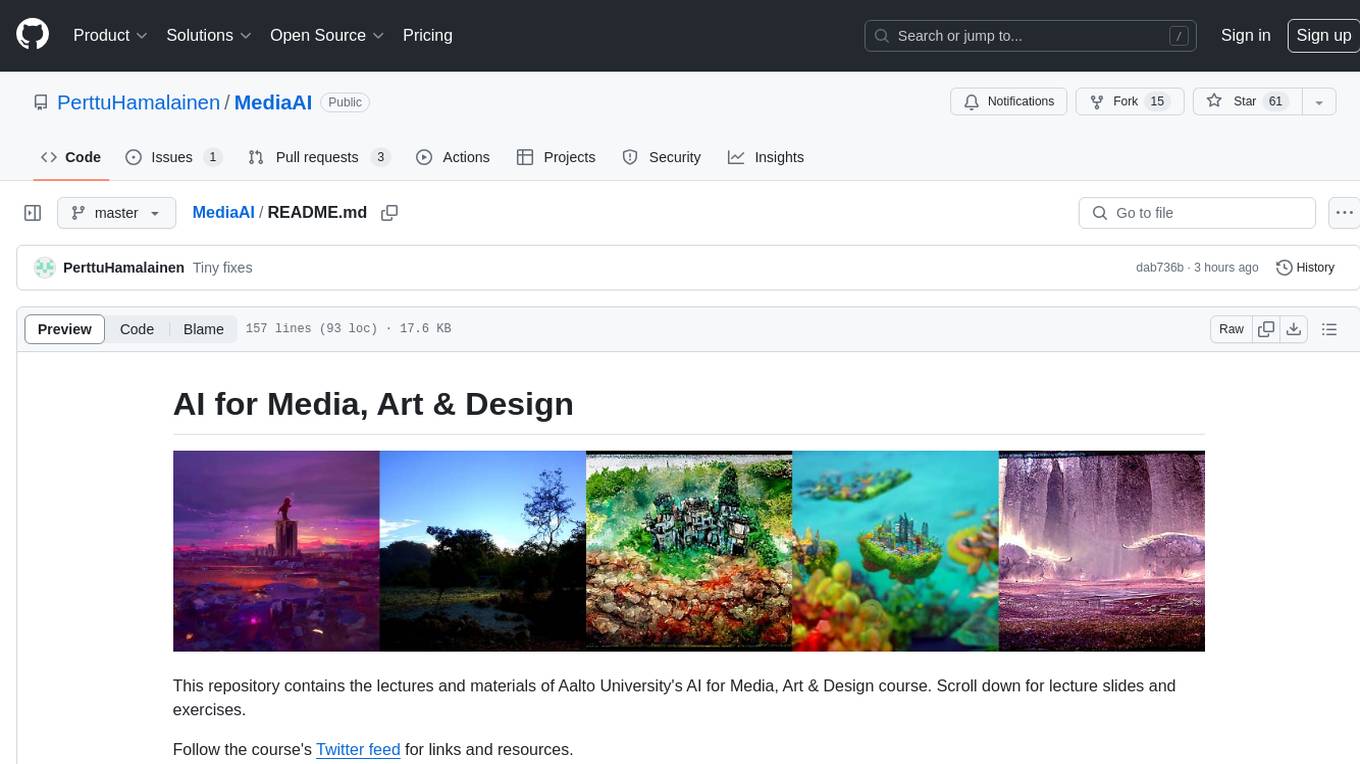
MediaAI
MediaAI is a repository containing lectures and materials for Aalto University's AI for Media, Art & Design course. The course is a hands-on, project-based crash course focusing on deep learning and AI techniques for artists and designers. It covers common AI algorithms & tools, their applications in art, media, and design, and provides hands-on practice in designing, implementing, and using these tools. The course includes lectures, exercises, and a final project based on students' interests. Students can complete the course without programming by creatively utilizing existing tools like ChatGPT and DALL-E. The course emphasizes collaboration, peer-to-peer tutoring, and project-based learning. It covers topics such as text generation, image generation, optimization, and game AI.
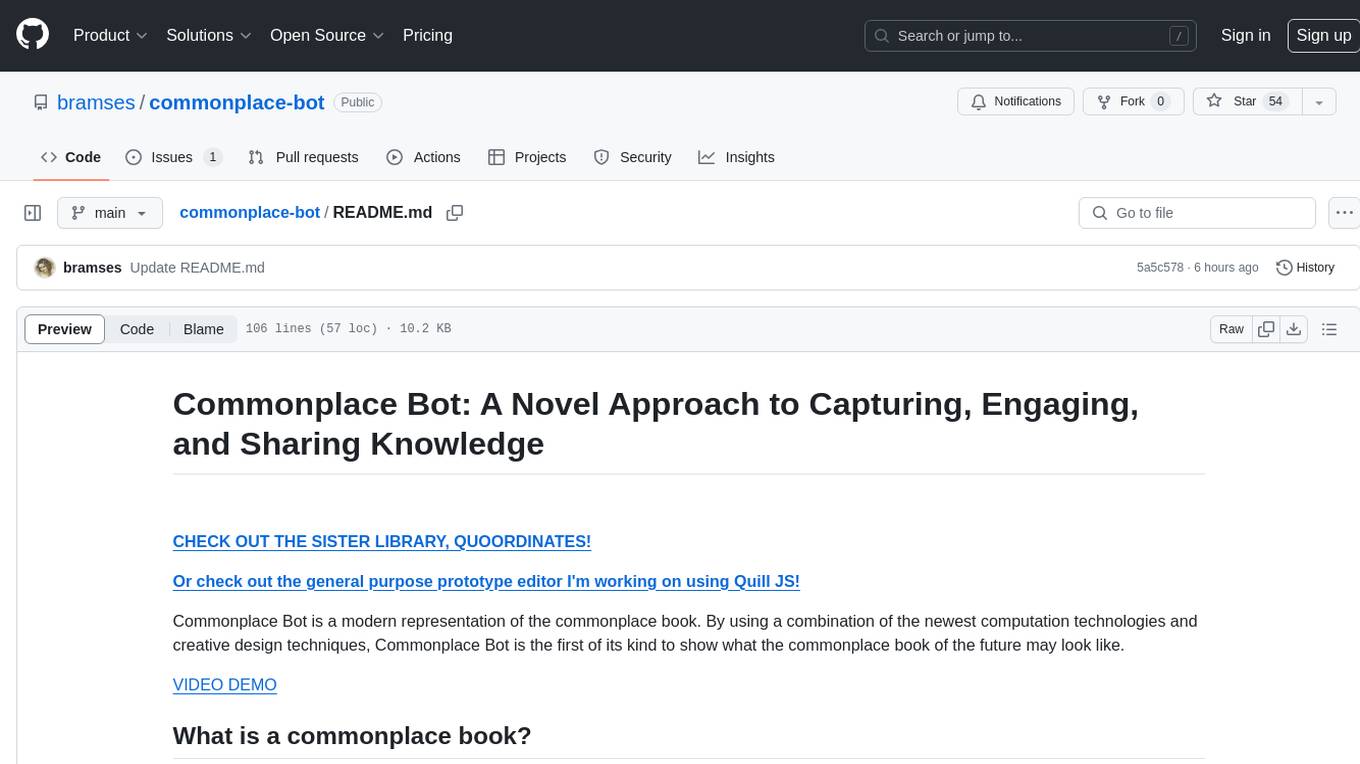
commonplace-bot
Commonplace Bot is a modern representation of the commonplace book, leveraging modern technological advancements in computation, data storage, machine learning, and networking. It aims to capture, engage, and share knowledge by providing a platform for users to collect ideas, quotes, and information, organize them efficiently, engage with the data through various strategies and triggers, and transform the data into new mediums for sharing. The tool utilizes embeddings and cached transformations for efficient data storage and retrieval, flips traditional engagement rules by engaging with the user, and enables users to alchemize raw data into new forms like art prompts. Commonplace Bot offers a unique approach to knowledge management and creative expression.
For similar tasks

PsyDI
PsyDI is a multi-modal and interactive chatbot designed for psychological assessments. It aims to explore users' cognitive styles through interactive analysis of their inputs, ultimately determining their Myers-Briggs Type Indicator (MBTI). The chatbot offers customized feedback and detailed analysis for each user, with upcoming features such as an MBTI gallery. Users can access PsyDI directly online to begin their journey of self-discovery.
For similar jobs
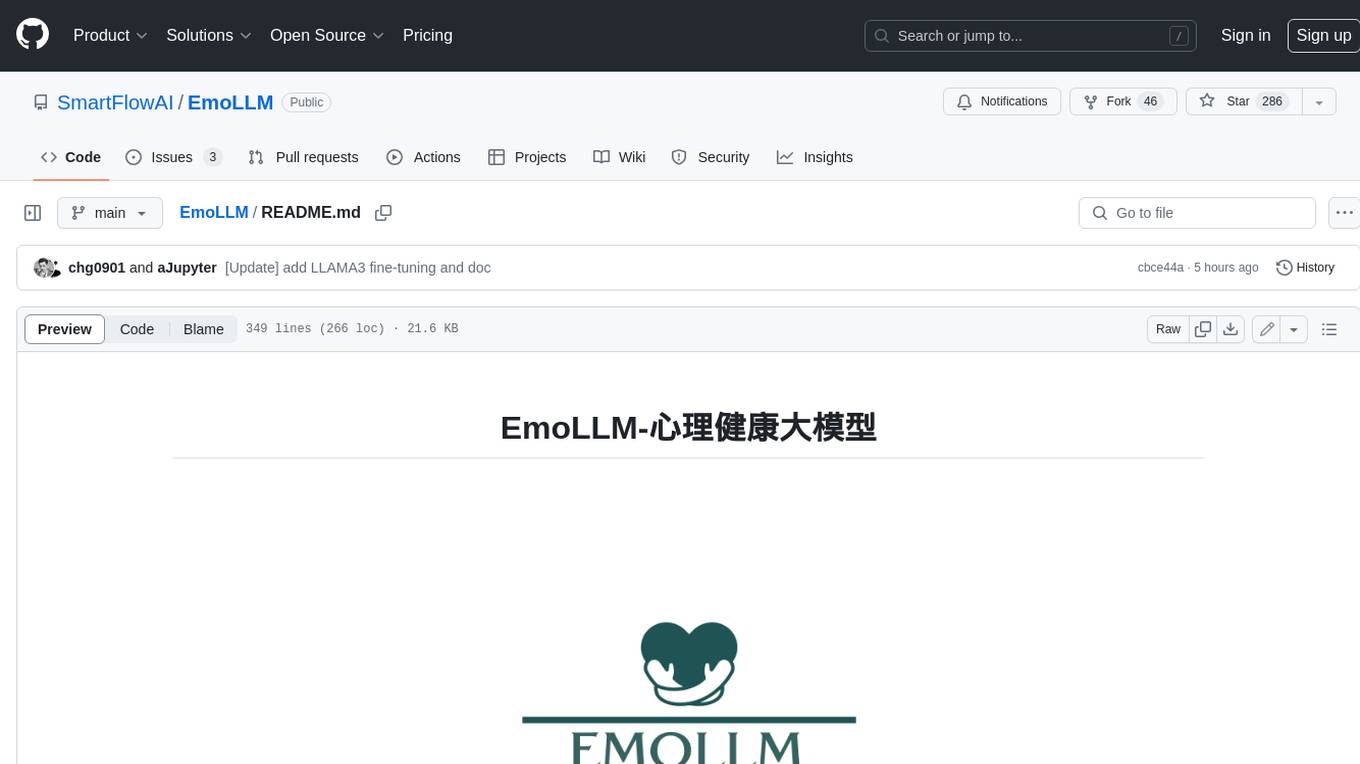
EmoLLM
EmoLLM is a series of large-scale psychological health counseling models that can support **understanding-supporting-helping users** in the psychological health counseling chain, which is fine-tuned from `LLM` instructions. Welcome everyone to star~⭐⭐. The currently open source `LLM` fine-tuning configurations are as follows:
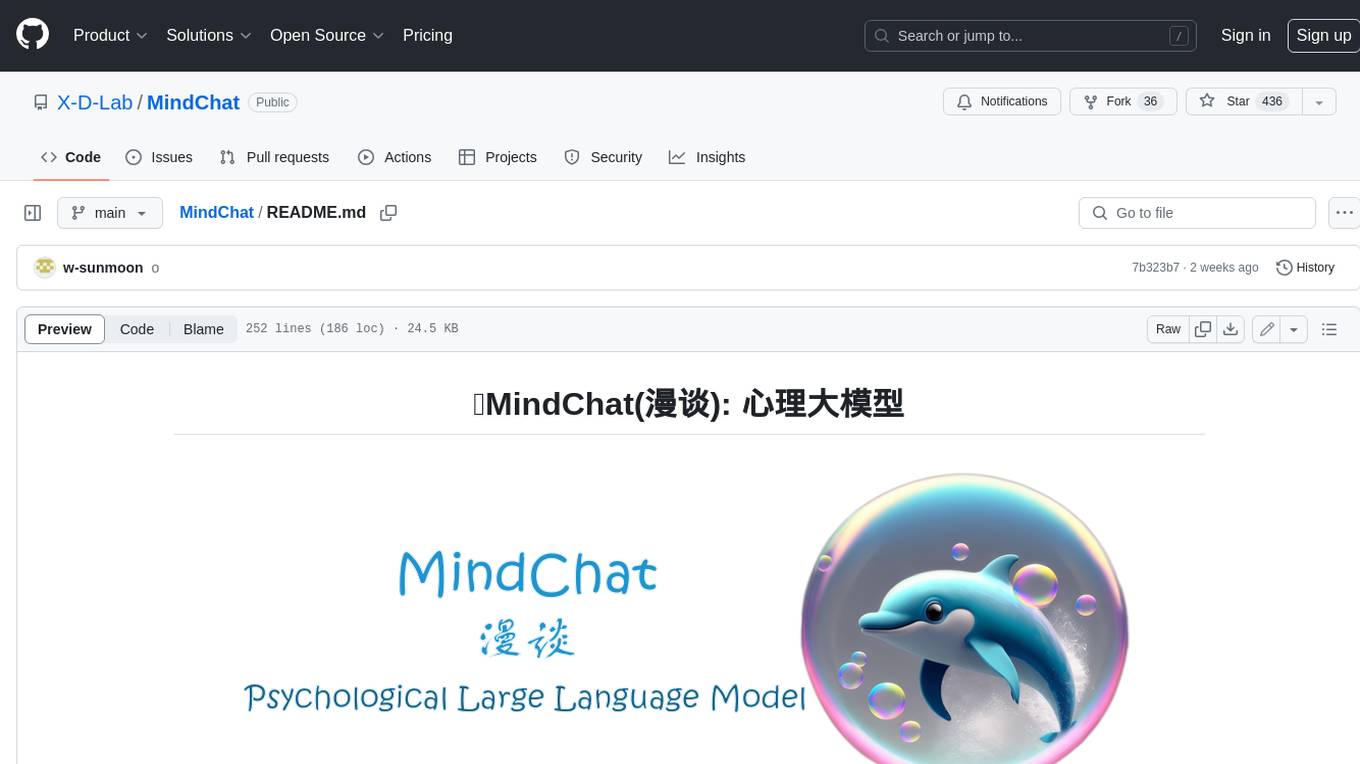
MindChat
MindChat is a psychological large language model designed to help individuals relieve psychological stress and solve mental confusion, ultimately improving mental health. It aims to provide a relaxed and open conversation environment for users to build trust and understanding. MindChat offers privacy, warmth, safety, timely, and convenient conversation settings to help users overcome difficulties and challenges, achieve self-growth, and development. The tool is suitable for both work and personal life scenarios, providing comprehensive psychological support and therapeutic assistance to users while strictly protecting user privacy. It combines psychological knowledge with artificial intelligence technology to contribute to a healthier, more inclusive, and equal society.

PsyDI
PsyDI is a multi-modal and interactive chatbot designed for psychological assessments. It aims to explore users' cognitive styles through interactive analysis of their inputs, ultimately determining their Myers-Briggs Type Indicator (MBTI). The chatbot offers customized feedback and detailed analysis for each user, with upcoming features such as an MBTI gallery. Users can access PsyDI directly online to begin their journey of self-discovery.
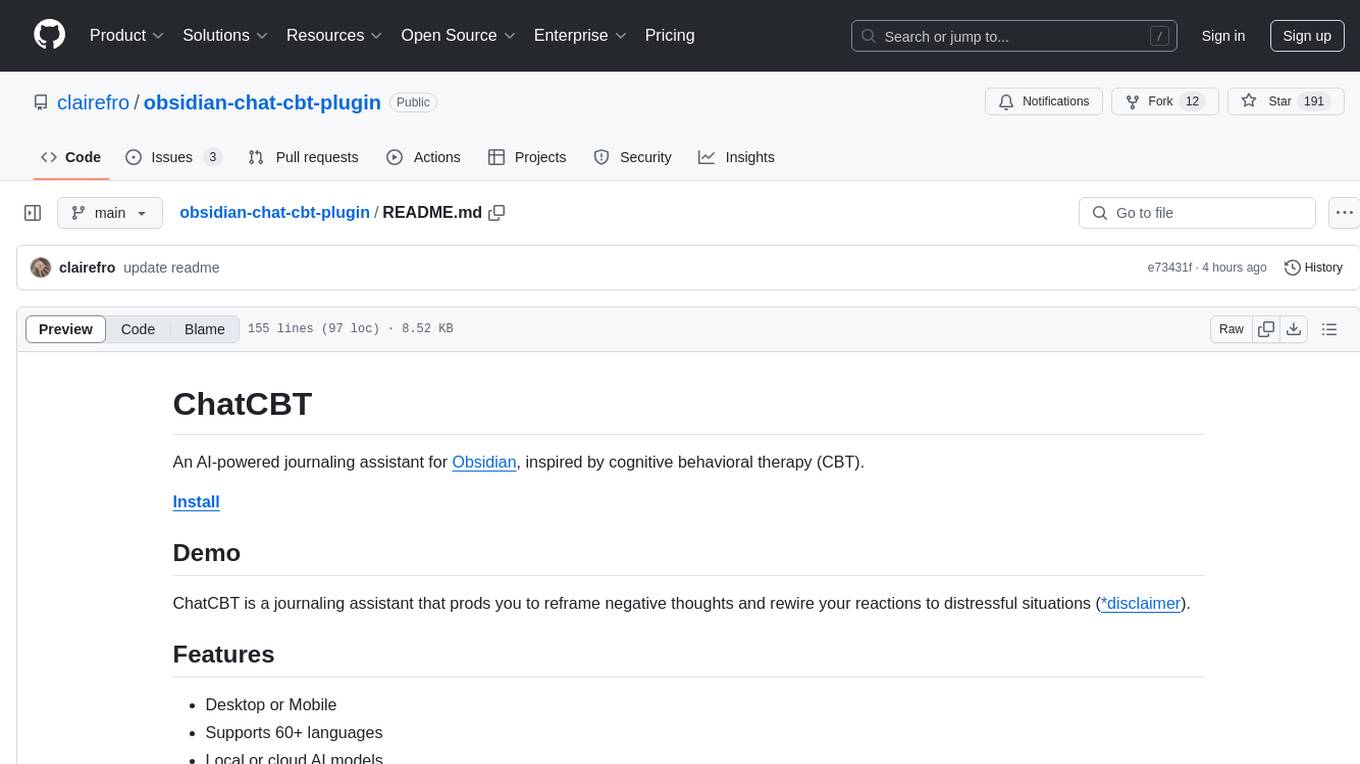
obsidian-chat-cbt-plugin
ChatCBT is an AI-powered journaling assistant for Obsidian, inspired by cognitive behavioral therapy (CBT). It helps users reframe negative thoughts and rewire reactions to distressful situations. The tool provides kind and objective responses to uncover negative thinking patterns, store conversations privately, and summarize reframed thoughts. Users can choose between a cloud-based AI service (OpenAI) or a local and private service (Ollama) for handling data. ChatCBT is not a replacement for therapy but serves as a journaling assistant to help users gain perspective on their problems.
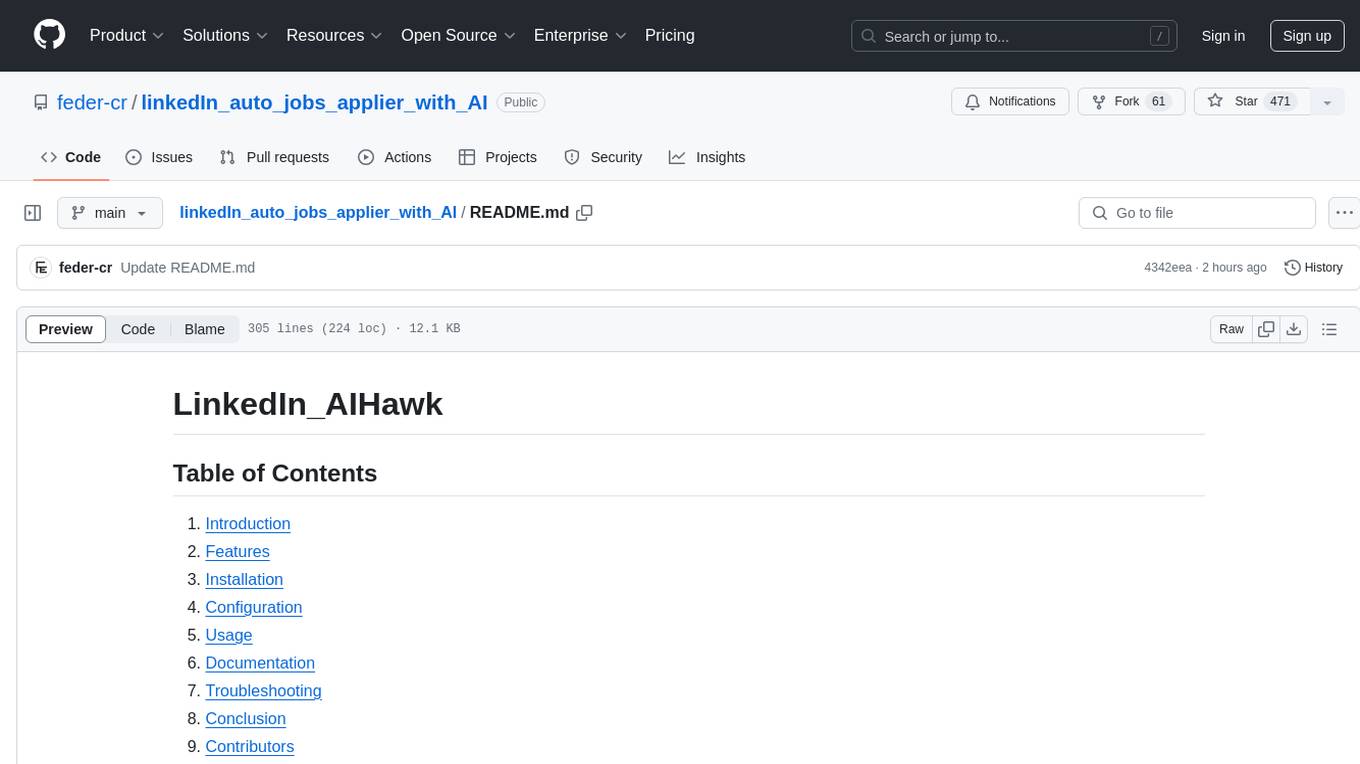
linkedIn_auto_jobs_applier_with_AI
LinkedIn_AIHawk is an automated tool designed to revolutionize the job search and application process on LinkedIn. It leverages automation and artificial intelligence to efficiently apply to relevant positions, personalize responses, manage application volume, filter listings, generate dynamic resumes, and handle sensitive information securely. The tool aims to save time, increase application relevance, and enhance job search effectiveness in today's competitive landscape.
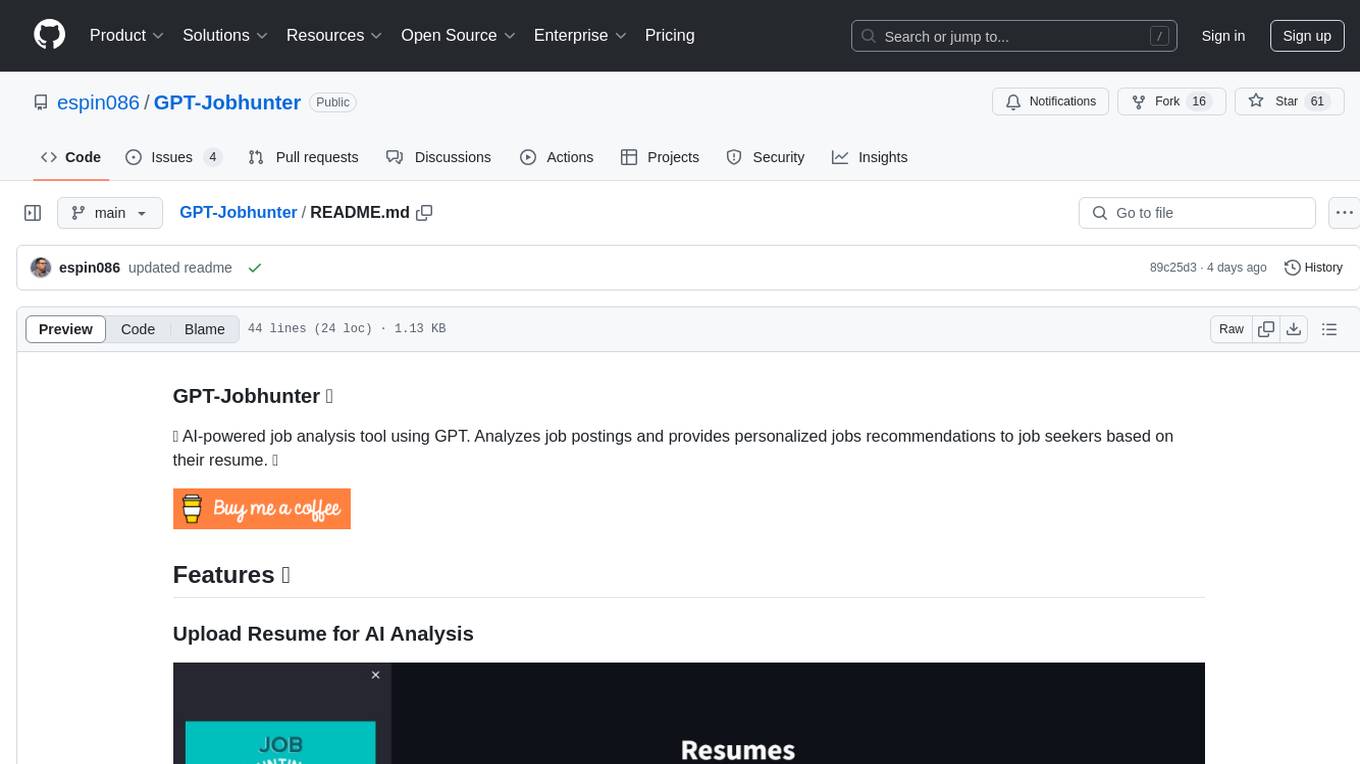
GPT-Jobhunter
GPT-Jobhunter is an AI-powered job analysis tool that utilizes GPT to analyze job postings and offer personalized job recommendations to job seekers based on their resume. The tool allows users to upload their resume for AI analysis, conduct highly configurable job searches, and automate the job search pipeline. It also provides AI-based job-to-resume similarity scores to help users find suitable job opportunities.
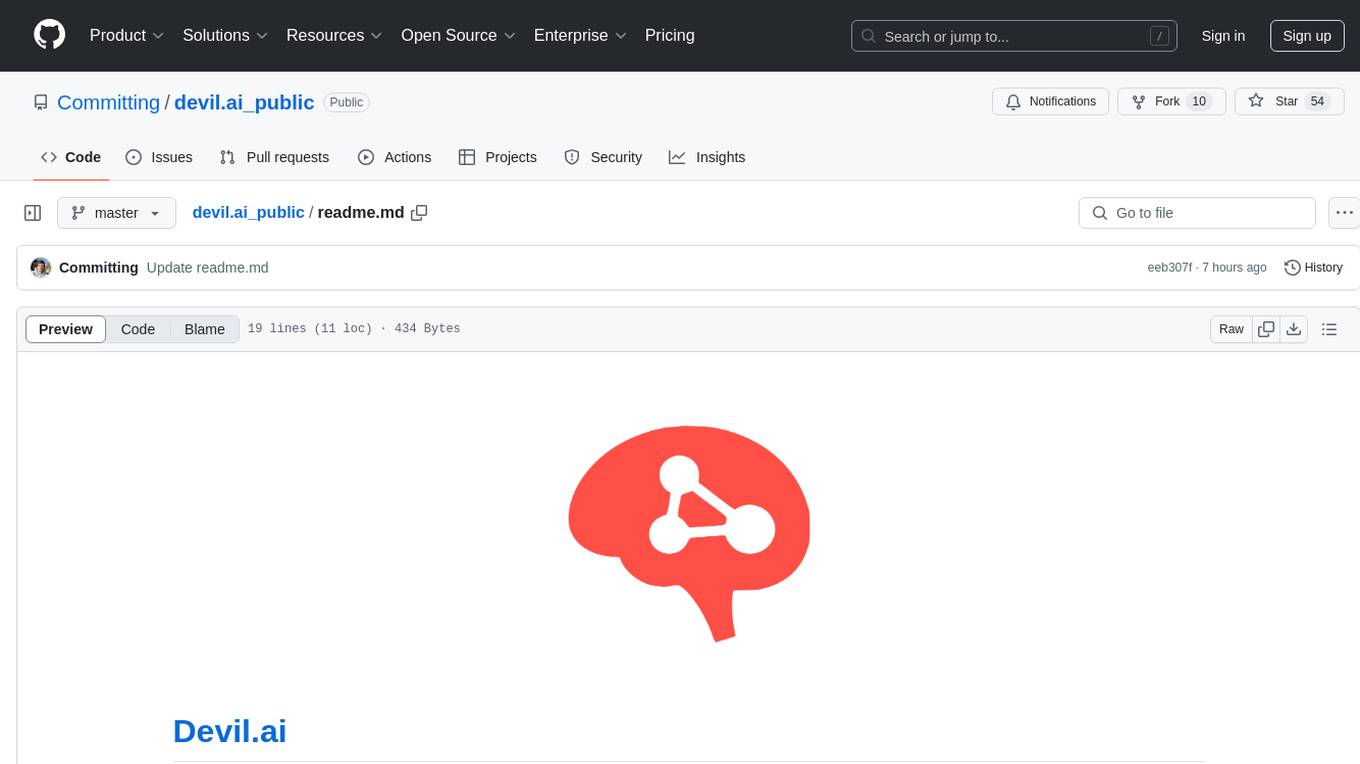
devil.ai_public
Devil.ai is a repository containing logic and data files for determining personality results. It includes classes for extended logic and calculation data related to MBTI personality types. The repository is licensed under MIT.
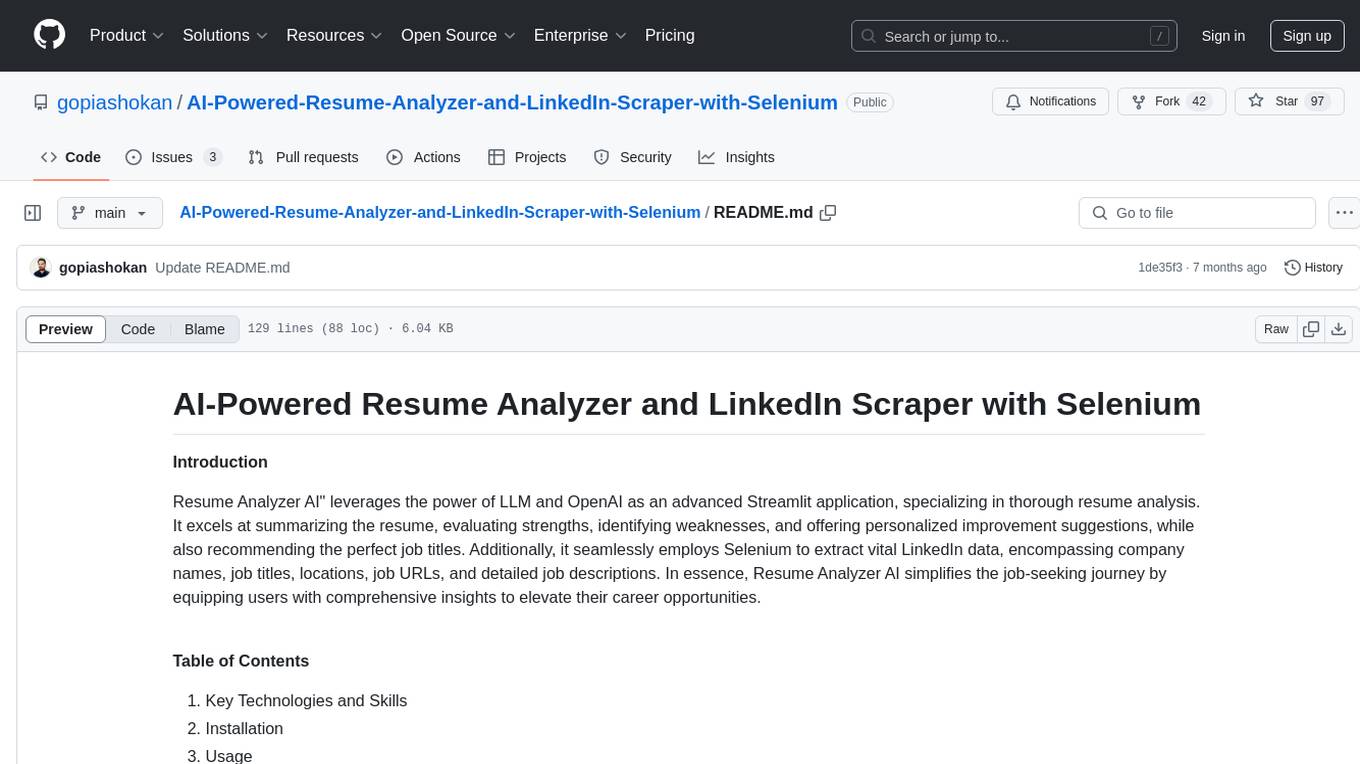
AI-Powered-Resume-Analyzer-and-LinkedIn-Scraper-with-Selenium
Resume Analyzer AI is an advanced Streamlit application that specializes in thorough resume analysis. It excels at summarizing resumes, evaluating strengths, identifying weaknesses, and offering personalized improvement suggestions. It also recommends job titles and uses Selenium to extract vital LinkedIn data. The tool simplifies the job-seeking journey by providing comprehensive insights to elevate career opportunities.





